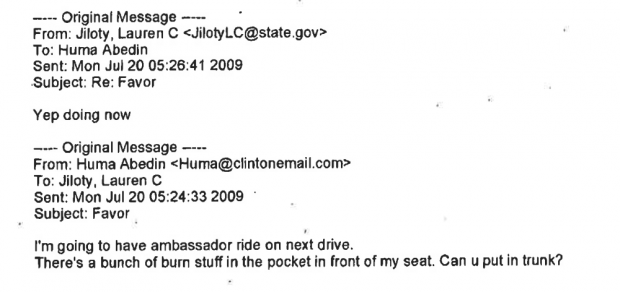Emails released on Monday show that Hillary Clinton’s top State Department aide, Huma Abedin, left classified government information that needed to be burned in the front seat of her vehicle.
“Favor” is the subject of Abedin’s July 20, 2009 email to Lauren Jiloty, Clinton’s personal assistant. Judicial Watch obtained the records and hundreds more pages of Abedin emails as part of its ongoing Freedom of Information Act lawsuit against the State Department.
“I’m going to have ambassador ride on next drive,” wrote Abedin. “There’s a bunch of burn stuff in the pocket of my front seat.”
And seemingly realizing the significance of her error, Abedin asked Jiloty to move the documents to a more secure location.
“Can u put in trunk?” she asked.

Jiloty told Abedin she would.
The State Department’s Foreign Affairs Manual provides rules related to the burning of agency materials and records. One section of the manual states that only classified material should be burned. It reads:
Burn bags must contain only the classified material that is to be destroyed. Personal documents, trash, recyclable materials, metal objects (such as binder clips and acco fasteners), string, twine, spiral bindings, cleaning cloths, food, or any other object that is not classified material should not be placed in a burn bag.
A State Department official tells The Daily Caller that in some cases, burn bags can be used to dispose of information that is sensitive but unclassified.
“Material disposed of in ‘burn bags’ is not limited to classified information. As the regulations state, Sensitive But Unclassified (SBU) and Personally identifiable information (PII) documents are often burned,” the official said, referring to another section of the Foreign Affairs Manual.
That section also lays out the consequences for failing to safeguard personally identifiable information. Such a failure can lead to criminal prosecution, administrative action such as termination or other adverse personnel action, or non-disciplinary action such as removal of authority to access information or information systems.
It is not entirely clear where Abedin’s vehicle was located when she asked for Jiloty’s help. But there is some evidence to suggest she, Jiloty and Clinton were in India at the time.
In one email, Abedin asks Jiloty to find out how far she was from a shopping district.
“He says santushti is a 10-minute drive from here,” Jiloty wrote, referring to a man identified as Jim in the email exchange.
New Delhi has a Santushti Shopping Complex. The State Department’s website also shows that Clinton was in India during that time period.
Abedin has spoken in the past of using burn bags at the State Department.
“If there was a schedule that was created that was her Secretary of State daily schedule, and a copy of that was then put in the burn bag, that…that certainly happened on…on more than one occasion,” Abedin told Judicial Watch lawyers during a deposition in late June, according to a New York Post article at the time.
Abedin’s apparent carelessness with classified information highlights the complaints that Clinton and her staff played fast and loose with classified information. FBI director James Comey said last month that Clinton’s use of an off-the-books email system to conduct State Department business was “extremely careless.”
Clinton sent and received more than 100 emails that contained classified information at the time the messages were originated, Comey said. Thousands more contain information that the State Department has retroactively deemed to be classified.
This article has been updated with comments from The State Department.


